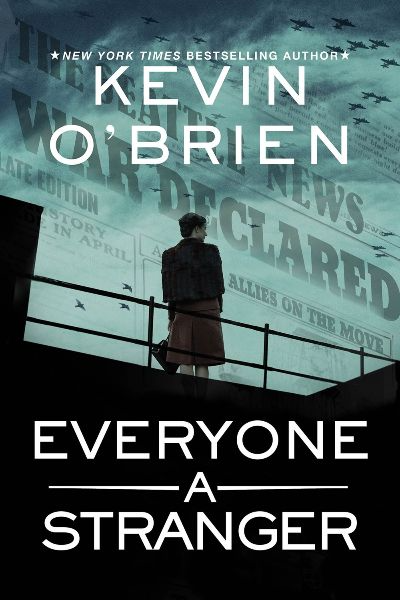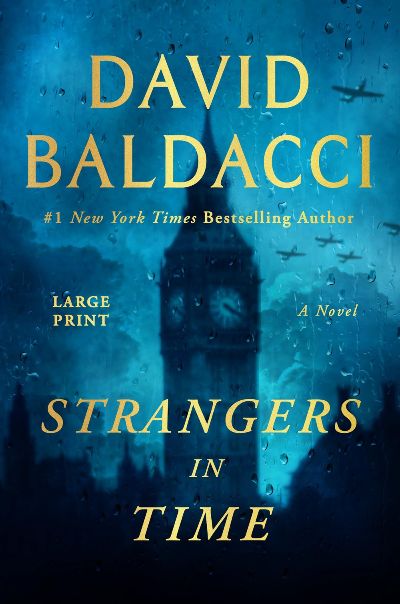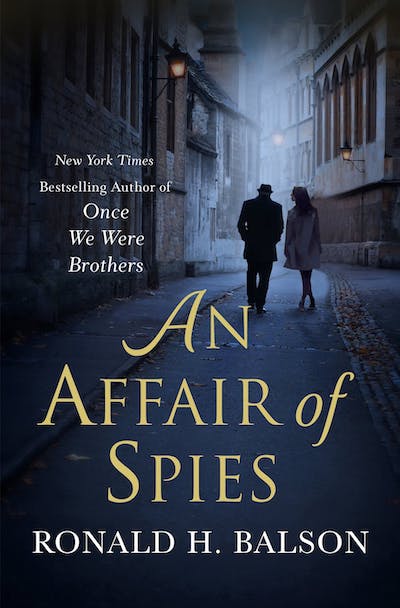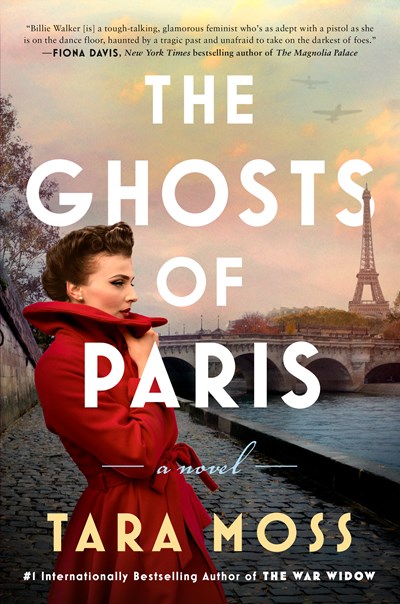Virginia Abrams lives in Washington, D.C., in 1943, and her husband has died overseas in the Pacific. The son of a prominent Senator attacks her, resulting in an unwanted pregnancy. When the son dies, his powerful parents decide to keep Virginia quiet by arranging to have her killed. Barely escaping, Virginia hops on a train and ends up on the other side of the country in Seattle. Under the identity of Ginny Moore, she rents an apartment and secures a job as a personal secretary to a well-established mystery author. But she can’t escape the feeling that the senator’s henchman will find her. When a young mom who looks almost identical to Ginny dies in what seems like an accidental fall, she starts to question everyone around her. Can anyone be trusted? At the height of WWII, when spies and traitors lurk around every corner, the paranoia escalates above a 10 in O’Brien’s latest thriller. In a story that feels like O’Brien traveled back in time and stole the manuscript straight from Alfred Hitchcock’s desk, Ginny’s struggle to find solace will have readers keeping their lights on while reaching for tissues. Everyone a Stranger is arguably the author’s best novel to date.
World War II
This old-fashioned gothic thriller (appropriate since our lead character has a PhD specializing in that genre) is set in WWII-era academia in New York’s Hudson Valley. Estella, or E as she prefers to be called, has been summoned home by Annie, the family retainer, because E’s mother has gone missing. In the time it takes E to pack up her life in Boston and return, her father has a stroke, can no longer communicate, and dies within days. Despite her Yale degree, the fusty local college where her father held sway employs E as a research assistant, typing for the male faculty members. The tiny salary requires E and Annie to live in penury in E’s parents’ elaborate house, all the while searching for clues to her mother’s whereabouts. Dragging the river finds a body of a missing student from years before, and persistence eventually finds a clue that leads to finding E’s mother. A suicide, unexpected allies, false and true friends, and bitter revelations about the past and present all lead to the dramatic “act of God” ending that such a story requires. Great fun!
The horrors of war are reflected in the lives of three people in Baldacci’s (A Calamity of Souls) latest. Fourteen-year-old Charlie Matters lives with his grandmother in cramped conditions. She thinks Charlie is spending his weekdays in school, but he has quit and spends the day roaming the streets, stealing food and money to survive. His goal is to eventually enlist and fight the Germans for taking away his parents and his sense of safety. When he steals from Ignatius Oliver’s bookshop, rather than demanding punishment for Charlie, Ignatius treats him well, almost like a father would. Like Charlie, Ignatius is dealing with loss, but it’s his wife instead of his parents. When 15-year-old Molly Wakefield returns to London after spending time away from the big city and conflict, she is horrified to learn her parents did not survive the bombing. The three bond, throughout the war trusting and protecting one another from a relentless enemy and secrets they can’t see coming. Baldacci chronicles the story of this makeshift family brought together by circumstances out of their control and how they can survive and confront whatever awaits. The author does a terrific job of transporting the reader back in time to a tumultuous period of living in London, and readers will practically smell the smoke and feel surrounded by rubble from the shattered buildings. Another great tale from a grandmaster storyteller.
It’s November 1940, and Evelyne Redfurn has returned to her London boarding house after six secretive, grueling weeks of training to be a Special Investigations Unit (SIU) agent for the British government’s Special Operations Executive (SOE). But before she can relax with her roommate and best friend, Moira, she’s called up for her first assignment. Hoping to be parachuted into occupied France (her mother was French), Evelyne is disappointed when she is sent instead to investigate the possibility of theft at a weapons research and development facility in rural Sussex. Worse, her handler is her old sparring partner, David Poole. On Evelyne’s first night, however, a routine probe becomes a murder case after she stumbles upon the body of Sir Nigel Balram, the leader of the engineering team at Blackthorn Park. His death appears to be an act of suicide, but drawing on the sleuthing skills she honed in A Traitor in Whitehall, Evelyne and David race to identify a killer before Prime Minister Winston Churchill’s impending visit. The clever and resourceful Evelyne is an appealing protagonist, who struggles to maintain her close friendships without revealing her double life as a spy. Her budding chemistry with David is obvious but doesn’t distract from the main plotline. Fans of Susan Elia MacNeal’s Maggie Hope series will delight in following the adventures of a promising new World War II spymaster.
The walled-off feeling of loneliness in a crowd pervades the pages of Hlad’s piercing historical thriller. Based on a fascinating and little-known true story of World War II, the tale sees librarians from New York Public Library sent throughout Europe to gather materials published by axis powers, photograph it, and send it via microfilm (the thumb drive of its day) back to New York to aid in overthrowing Hitler. Our hero is Maria Alves, a Portuguese American who, due to her parents’ jobs as newspaper photographers, lived all over the world as a child and speaks six languages. Sent to a neutral—but still dangerous—Portugal to scour bookstores for war-relevant information, her cover is that she is working for the Library of Congress to gather materials that are in danger of being destroyed in the conflict. Under no circumstances is she to engage in spying, but that undertaking soon falls by the wayside as the extent of the horror in nearby occupied France becomes apparent. Also affected by the French occupation is Tiago Soares, a Lisbon bookseller whose Grand-père and Grand-mère in Bordeaux run an operation that smuggles Jews to Lisbon, where increasing crowds of penniless, paperless refugees await passage to the United States. Hlad’s immersive portrayal of wartime Lisbon and its inhabitants, of the loneliness caused by the terror that anybody at any time could be an informant, plus his captivating thriller/romance tale make this a must-read, especially for fans of Kate Quinn’s The Rose Code.
We’re deep into the Second World War, and Archie Swann—the police officer on Fourth Cliff, a fishing island off the Massachusetts coast—is fighting in the Pacific theater. But his wife, Mary Beth, herself a cop trained by the Boston Police Department, has stepped into his position. While Archie was beloved, Mary Beth is loathed, largely because of her gender, and the easiest of tasks is a struggle. While the island has traditionally seen little crime—settling fights between drunk fishermen and resolving domestic disputes seemed to be the bulk of the work—things have changed under Mary Beth’s watch. The body of a soldier, who lived in a camp for Italian POWs on the island, is hauled up from the sea by fishermen, a murder that creates unrest among both islanders and prisoners. When that murder is followed by others, Mary Beth, whose supports are a doctor who is untrained as a coroner and a deputy who is intellectually disabled, turns to the only real help she can find: organized crime from the mainland. But the real story here is the internal one: Mary Beth’s loneliness, her longing for Archie, her need to always maintain a tough outer shell, her battle against feeling like a failure. Novels about women in the War have blossomed in the past few years, but few have the grittiness, honesty, and authenticity in emotion, language, and detail of Swann’s War.
It’s 1943, and U.S. Army Sergeant Nathan Silverman is preparing to head back to Germany, his homeland, to fight the Nazis and, he hopes, find his close-knit Jewish family still alive. He’s one of the “Ritchie Boys,” members of a real WWII army unit made up of Germans and Austrians who were trained in intelligence and sent back to Europe as spies. But his days at Camp Ritchie are interrupted when Uncle Sam orders him to New York City to prepare for a different mission. Nathan has a valuable connection: his father is a physicist with the Nazi equivalent of the Manhattan Project, and the allies can use Nathan to find out how close Germany is to building a nuclear bomb. One problem: Nathan knows little about physics, but the army has taken care of this. His partner on the trip will be an American physicist, Dr. Fisher, whom Nathan is surprised to find is a young woman rather than the aging male academic he expected. The setup is absorbing on its own, with Balson (winner of the National Jewish Book Award for The Girl from Berlin) providing actual details about the race on both sides of the Atlantic to make a devastating weapon. Once the pair heads off, the action doesn’t disappoint either, at one point involving the most audacious plan imaginable to trick the enemy. There are sad moments and romantic ones here, but overall this is one nailbiting espionage scene after another, and perfect for fans of the large World War II spy genre.
Part historical fiction, part mystery, this sweeping novel picks up the reader and transports them on a whirlwind trip from Sydney to London to Paris, where the long and compelling search finally comes to an end. It’s 1947, and the Second World War has been over for two years, although its impact remains enormous. Detective Billie Walker is hired by a well-to-do woman to find her husband, who’s been missing in Europe these past two years, and before you can say Qantas, Billie is up in the air, accompanied by Sam, her handsome assistant. Funny thing is, Billie also has a husband lost in Europe—a wartime photographer—providing the story with a double plot. But the greatest pleasure in this book comes from all the rich history and social commentary: the experiences of the Australian Aboriginal peoples with the police, the legal persecution of Australia’s gay men, Dior’s new look, London as it climbs out of from the Blitz, Paris as it tries to recoup, and so much more. The author has done her research, and it shows—in the best possible way. Moss does slam on the brakes, and the book rattles to a quick close, but that’s O.K. We’re happy where we’ve landed, and would follow Billie Walker anywhere.
It’s 1939 and a vicious serial killer is pursuing his bloody wont in Berlin’s trains. Assigned to these cases, which his superiors in the Kriminalpolizei, or Kripo, think are unrelated accidents, is Inspector Horst Schenke, a former racecar driver who’s embarrassed that injuries related to his old career have kept him from the front. He’s not one to rock the boat but quietly resists the ridiculous bureaucracy, lawlessness, and brutality of “the party,” even as his thuggish superiors hint and then state outright that he won’t get ahead without a Nazi badge. Glamorous dates (or as glamorous as nightly blackouts, rationing, and lack of fuel allow) with his resistance-leaning girlfriend keep the moral quandaries from eating Schenke up too much, but when the killer goes after a Jewish woman, Ruth Frankel, a surviving witness whom the inspector feels compelled to save, the pressure is on. Nazi higher-ups feel the woman can be used as bait and force a bootlicking rule-follower to shadow Schenke’s every move so he’ll comply. At the same time, the killer continues his spree while attempting to cover his tracks, an effort that puts Ruth and her protector in grave danger. The close calls and chases in this novel are truly scary, and the unusual perspective ramps up the intrigue. Fans of serial-killer mysteries who are looking for something a little different are the audience for this one.
There’s no shortage of WWII novels, but this second in a duology is happily in the less-crowded subgenre of the women behind the scenes. It stars Olive Bright, a kind, loyal, and sometimes-brash young woman who keeps even family in the dark about her work. Pre-war, she inherited her father’s loft of racing pigeons, and now lends them to the war effort as carriers. They’re brought from England to mainland Europe by government agents, then fly home bearing maps and letters that Olive and her gruff supervisor, the dashingly named Jameson Aldridge, hope will help beat the Nazis. Olive’s avian work isn’t the only deceit here; as cover for her job at the Bletchley Park-like Brickendonbury Manor, she and Jamie pretend to be in a relationship, but she hopes for more between them (as will readers). The mystery here concerns a body found in nearby woods, but the worldbuilding, characters, and details of espionage-assisting pigeons make the tale. Graves’s afterword discusses the real Operation Columba, which saw the allies drop thousands of pigeons from Denmark to France from 1941 to ‘44. Readers can go back to the first book in the series, Olive Bright, Pigeoneer; also try Kate Quinn’s The Rose Code, which features women codebreakers at Bletchley Park
- 1
- 2










